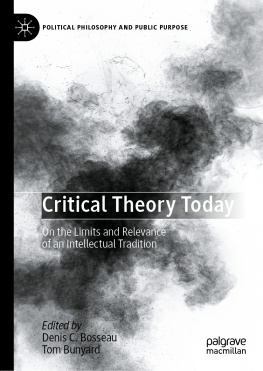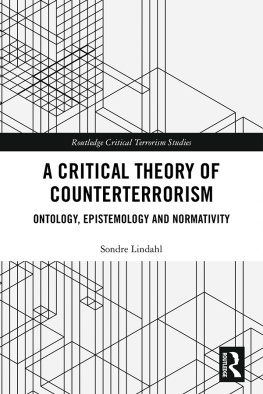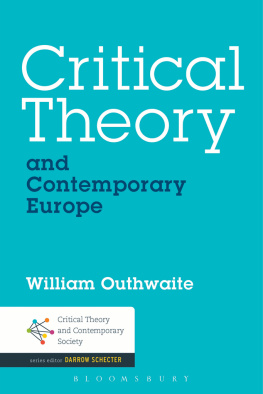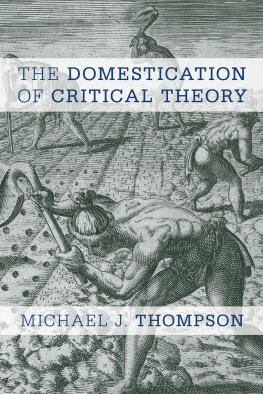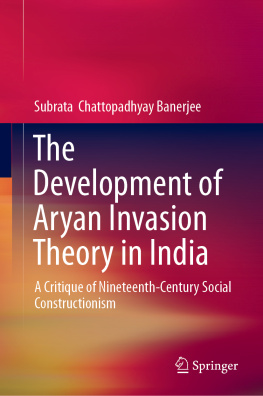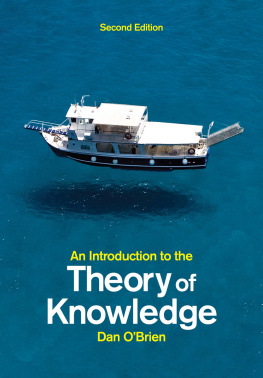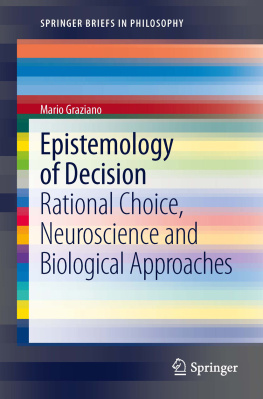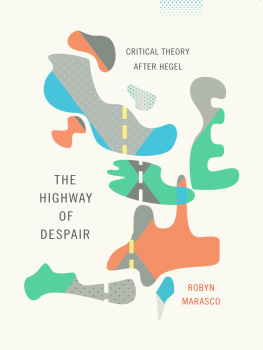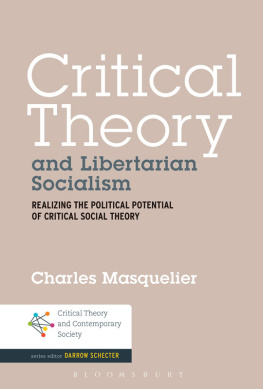Critical theory and epistemology
Critical theory and contemporary society
Series editors:
David M. Berry, Professor of Digital Humanities, University of Sussex
Darrow Schecter, Reader in Critical Theory, University of Sussex
The Critical Theory and Contemporary Society series aims to demonstrate the ongoing relevance of multi-disciplinary research in explaining the causes of pressing social problems today and in indicating the possible paths towards a libertarian transformation of twenty-first century society. It builds upon some of the main ideas of first generation critical theorists, including Horkheimer, Adorno, Benjamin, Marcuse and Fromm, but it does not aim to provide systematic guides to the work of those thinkers. Rather, each volume focuses on ways of thinking about the political dimensions of a particular topic, which include political economy, law, popular culture, globalization, feminism, theology and terrorism. Authors are encouraged to build on the legacy of first generation Frankfurt School theorists and their influences (Kant, Hegel, Kierkegaard, Marx, Nietzsche, Weber and Freud) in a manner that is distinct from, though not necessarily hostile to, the broad lines of second-generation critical theory. The series sets ambitious theoretical standards, aiming to engage and challenge an interdisciplinary readership of students and scholars across political theory, philosophy, sociology, history, media studies and literary studies.
Previously published by Bloomsbury
Critical theory in the twenty-first century Darrow Schecter
Critical theory and the critique of political economy Werner Bonefeld
Critical theory and contemporary Europe William Outhwaite
Critical theory of legal revolutions Hauke Brunkhorst
Critical theory of libertarian socialism Charles Masquelier
Critical theory and film Fabio Vighi
Critical theory and the digital David Berry
Critical theory and disability Teodor Mladenov
Critical theory and the crisis of contemporary capitalism Heiko Feldner and Fabio Vighi
Forthcoming from Manchester University Press
Critical theory and legal autopoiesis Gunther Teubner
Critical theory and contemporary technology Ben Roberts
Critical theory and sociological theory Darrow Schecter
Critical theory and feelings Simon Mussell
Critical theory and demagogic populism Paul K. Jones
Critical theory and epistemology
The politics of modern thought and science
ANASTASIA MARINOPOULOU
Manchester University Press
Copyright Anastasia Marinopoulou 2017
The right of Anastasia Marinopoulou to be identified as the author of this work has been asserted by her in accordance with the Copyright, Designs and Patents Act 1988.
Published by Manchester University Press
Altrincham Street, Manchester M1 7JA
www.manchesteruniversitypress.co.uk
British Library Cataloguing-in-Publication Data
A catalogue record for this book is available from the British Library
ISBN 978 1 5261 0537 0 hardback
First published 2017
The publisher has no responsibility for the persistence or accuracy of URLs for any external or third-party internet websites referred to in this book, and does not guarantee that any content on such websites is, or will remain, accurate or appropriate.
Typeset by Out of House Publishing
To my mother,
Christina Marinopoulou,
who encouraged me towards irreverent dialogue
It is through wonder that men now begin and originally began to philosophize; wondering in the first place at obvious perplexities, and then by gradual progression raising questions about the greater matters too, e.g. about the changes of the moon and of the sun, about the stars and about the origin of the universe.
Aristotle, Metaphysics 982b 1015
Contents
A book usually has a very long gestation period, during which the writer realizes that team work is required, rather than solitary research alone, as the writer initially thought. Although the usual suspect for a books flaws or failings is only the writer, there were some excellent things, too, that took place during a very long route that started long before the signing of any contract.
I owe particular thanks to the series editor, Dr Darrow Schecter. He gave me the opportunity to participate in such an innovative and creative process as the publication of the book series on critical theory. His generous trust towards my work multiplied my sense of responsibility. Marie-Claire Antoinne (thank you so much!) and Michelle Chen were valuable supporters of the present project.
To Professor Dr William Outhwaite, I owe more than words permit me to acknowledge. Everyone who has worked with him is aware that he is one of the most progressive and erudite scholars nowadays. No matter how hard I try, everything I write seems insufficient to compensate for the privilege of being in dialogue with him.
Professor Dr Jrgen Habermas response to my questions was an immense help, and I owe him grateful thanks. Particular thanks are due to Professor Emeritus Dr Dimitrios Andriopoulos. His advice and academic suggestions have been of great value to me throughout the years. A special note of thanks is owed to Professor Dr Gerasimos Kouzelis for encouraging me to present my research work at the National and Kapodistrian University of Athens.
I am grateful towards Associate Professor Dr Gerassimos Moschonas for all the persistent (and perhaps irritating) questions he answered, and most of all for encouraging uncoerced dialogue, as all inspired scientists know how to allow to happen and promote. I remain indebted to Professor Dr Stefan Mller-Doohm who offered me his generous scientific assistance in multifarious ways, and taught me many invaluable things. Professor Dr Gonda Van Steen encouraged my research in every way she could without ever frowning upon my constant outrageous requests. I am especially grateful to Professor Alexander P. D. Mourelatos for his advice and generosity. I am also grateful to Dr David Straw and Dr Simon Mussell because their expertise supported the completion of the book and deeply appreciate the constant help and criticism of Eirini Patsi (congratulations for all your successes!), whose unwavering support and cooperation proved invaluable.
There is always the inner circle.
My mother, Christina Marinopoulou, an outstanding school teacher showed understanding and most of all encouraged my efforts immensely, when for years my permanent answer to her questions and requests was the negation: I have work, I have to study.
Vicky Kontou allowed me to be her lifelong friend and confidant, showed me in many ways what inner strength and determination towards an aim mean, and supported the completion of the present book with her generosity and discretion towards my constant refusals to participate in a cherished friendship for the sake of my work. I am immeasurably grateful for her toleration of all my anxieties.
Dr Eva Klinkisch merits special thanks. Many times she outdid herself with words of encouragement along with deeds of kindness. Friendship and conversations with her on political theory and philosophy have always been very important to me.
I would also like to thank my friends, who happen to be excellent colleagues too, Senior Researcher Dr Alexander Afouxenidis, Associate Professor Dr Manos Spyridakis, Dr Leonidas Vatikiotis and Assistant Professor Dr Akis Leledakis for their guidance and friendship throughout many difficulties I faced.
Next page

